Angela Verbrugge: Somewhere (OA2 Records, 2024) (A-): Among these seven songs performed by Canada’s Angela Verbrugge is the artist’s own 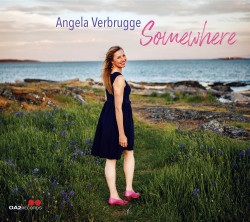 “Je ne veux pas te dire bonsoir,” which, like the album generally, is infused with romanticism. Unlike the others, though, it was written by the artist herself, which leaves us keen to hear more of her own compositions in future. Also vying for pride of place here is the great Leonard Berstein/Stephen Sondheim song “Somewhere” from “West Side Story.” This rendition of that beloved song is gentle, restrained, and introspective, deliberately more subdued, somehow, than what we’ve heard elsewhere. There’s a gentle poignancy to “If the Moon Turns Green,” with lyrics that speak to the inner romantic in all of us: “Just when I thought that fate was unkind, that happiness wasn’t to be…” “For You, For Me, Forevermore” by George & Ira Gershwin is a lullaby for grownups with an irresistibly tender accessibility. “Born to be Blue,” with its jazzy, bluesy sound, has an appealing intimacy that makes you feel like the singer is nearby, singing just to you. For its part, “Until I Met You” has playful changes in tempo while “I had the Craziest Dream” gives us the sense that the singer is confiding just to us. Throughout this selection of songs, Verbrugge has a lovely voice which exudes sincerity: neither showy nor stagey, it offers a very appealing natural authenticity in the setting of these mostly jazzy pieces. She was nominated as Jazz Artist of the Year at the Western Canadian Music Awards in 2024. Her accompanists on this album are Ray Gallon & Miles Black on piano, Cameron Brown & Jodi Proznick on bass, Anthony Pinciotti & Joel Fountain on drums, Dave Say on saxophone, and Erik Kalaidzis as vocal partner on “Somewhere.” https://angelaverbrugge.com/
“Je ne veux pas te dire bonsoir,” which, like the album generally, is infused with romanticism. Unlike the others, though, it was written by the artist herself, which leaves us keen to hear more of her own compositions in future. Also vying for pride of place here is the great Leonard Berstein/Stephen Sondheim song “Somewhere” from “West Side Story.” This rendition of that beloved song is gentle, restrained, and introspective, deliberately more subdued, somehow, than what we’ve heard elsewhere. There’s a gentle poignancy to “If the Moon Turns Green,” with lyrics that speak to the inner romantic in all of us: “Just when I thought that fate was unkind, that happiness wasn’t to be…” “For You, For Me, Forevermore” by George & Ira Gershwin is a lullaby for grownups with an irresistibly tender accessibility. “Born to be Blue,” with its jazzy, bluesy sound, has an appealing intimacy that makes you feel like the singer is nearby, singing just to you. For its part, “Until I Met You” has playful changes in tempo while “I had the Craziest Dream” gives us the sense that the singer is confiding just to us. Throughout this selection of songs, Verbrugge has a lovely voice which exudes sincerity: neither showy nor stagey, it offers a very appealing natural authenticity in the setting of these mostly jazzy pieces. She was nominated as Jazz Artist of the Year at the Western Canadian Music Awards in 2024. Her accompanists on this album are Ray Gallon & Miles Black on piano, Cameron Brown & Jodi Proznick on bass, Anthony Pinciotti & Joel Fountain on drums, Dave Say on saxophone, and Erik Kalaidzis as vocal partner on “Somewhere.” https://angelaverbrugge.com/
Review copyright © 2025 by John Arkelian
****************************************
Diana Panton: Soft Winds and Roses (2024) (A): These 14 songs sung by Diana Panton are love at first listen. The enchanting warmth, ![]() tenderness, and authenticity of her voice is irresistible, and we find ourselves transported body and soul to an intimate nightclub of the imagination. The source material is eclectic and all of it is infused with a highly infectious romanticism. “Here, There and Everywhere” (written by Lennon & McCartney) is an affecting thing of beauty. The lyrics from Gordon Lightfoot’s “Pussywillows, Cat-Tails” give the album its title, while the erstwhile unfamiliar (to us) song evokes the ‘shivering and quivering’ it ascribes to ‘the promises of spring.’ “Until It’s Time for You to Go” restores one’s eroded faith in romantic love, while “How Deep is Your Love?” gives the Gibb brothers’ song a more softly intimate feel and sound than their own. Full of ‘moondust and golden starlight,’ “They Long to Be Close to You,” written by Burt Bacharach & Hal David and made famous by The Carpenters, is achingly tender, while Panton takes Elton’s John’s “Your Song” and makes it a gently romantic reverie all her own. Likewise with Leonard Cohen’s “Hey, That’s No Way to Say Goodbye,” poetry put to music which opens with a lovely a cappella section. For their part, “You and I” has a nice jazzy tempo, while Don McLean’s “And I Love You So” is exquisitely poignant. Diana Panton is accompanied on this album by Reg Schwager on guitar and the album’s arranger Don Thompson on bass, piano, and vibes. The result, from one of our favorite Canadian singers, is highly recommended. https://www.dianapanton.com/
tenderness, and authenticity of her voice is irresistible, and we find ourselves transported body and soul to an intimate nightclub of the imagination. The source material is eclectic and all of it is infused with a highly infectious romanticism. “Here, There and Everywhere” (written by Lennon & McCartney) is an affecting thing of beauty. The lyrics from Gordon Lightfoot’s “Pussywillows, Cat-Tails” give the album its title, while the erstwhile unfamiliar (to us) song evokes the ‘shivering and quivering’ it ascribes to ‘the promises of spring.’ “Until It’s Time for You to Go” restores one’s eroded faith in romantic love, while “How Deep is Your Love?” gives the Gibb brothers’ song a more softly intimate feel and sound than their own. Full of ‘moondust and golden starlight,’ “They Long to Be Close to You,” written by Burt Bacharach & Hal David and made famous by The Carpenters, is achingly tender, while Panton takes Elton’s John’s “Your Song” and makes it a gently romantic reverie all her own. Likewise with Leonard Cohen’s “Hey, That’s No Way to Say Goodbye,” poetry put to music which opens with a lovely a cappella section. For their part, “You and I” has a nice jazzy tempo, while Don McLean’s “And I Love You So” is exquisitely poignant. Diana Panton is accompanied on this album by Reg Schwager on guitar and the album’s arranger Don Thompson on bass, piano, and vibes. The result, from one of our favorite Canadian singers, is highly recommended. https://www.dianapanton.com/
Review copyright © 2024 by John Arkelian
****************************************
Music from the Star Wars Saga: The Essential Collection (Sony Classical, 2019) (A): These 18 tracks are gleaned from the first eight of the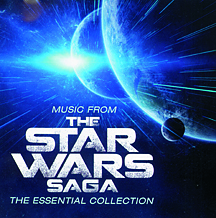 nine films in the Star Wars franchise that specifically follow the three-generational story of the Skywalker family. The music is composed by John Williams and performed by the Slovak National Symphony Orchestra (and members of the national Philharmonic Choir) conducted by Robert Ziegler. If only the movies were as good as the music! The former have their moments, but too often they are bland, pedestrian, and emotionally (and narratively) unsophisticated. With too-rare exceptions, the stories just can’t sustain the dark drama, sublime romanticism, and the sheer frenetic energy of the music. John Williams did his best work for this series early in its run. Memorable pieces were thick on the ground for the first two or three films. Much (but not all) of what followed was serviceable but lacked stand-alone impact. The album follows the chronological order of the story, rather than the order in which the films were made. The “Star Wars Main Title” theme, used for all eight of the main series films on offer here (plus the missing ninth installment) is instantly recognizable — and rousing. “Duel of the Fates” is a darkly operatic and frenzied confrontation with the diabolical which has the choir singing a menacing dirge-like chant. “Princess Leia’s Theme” is lyrical, balletic, and utterly romantic — beautiful music with an emotional impact. “The Asteroid Field” is fast and furious as it swoops and darts and carries us away breathlessly. “Yoda’s Theme” is as poignant and strong as the proverbial ‘Force’ — a musical rendering of wisdom and goodness. It finds its polar opposite in “The Imperial March (Darth Vader’s Theme),” which is kin to “The Dance of the Knights” in Prokofiev’s “Romeo and Juliet” insofar as it is the musical embodiment of power, pride, darkness, and aggression. “Parade of the Ewoks” gives playful voice to the pint-sized furry friends introduced in “Return of the Jedi,” while “Ahch-To Island” has a poignantly melancholy melody embedded in it, but it feels inchoate, surrounded, as it is, by filler cues.
nine films in the Star Wars franchise that specifically follow the three-generational story of the Skywalker family. The music is composed by John Williams and performed by the Slovak National Symphony Orchestra (and members of the national Philharmonic Choir) conducted by Robert Ziegler. If only the movies were as good as the music! The former have their moments, but too often they are bland, pedestrian, and emotionally (and narratively) unsophisticated. With too-rare exceptions, the stories just can’t sustain the dark drama, sublime romanticism, and the sheer frenetic energy of the music. John Williams did his best work for this series early in its run. Memorable pieces were thick on the ground for the first two or three films. Much (but not all) of what followed was serviceable but lacked stand-alone impact. The album follows the chronological order of the story, rather than the order in which the films were made. The “Star Wars Main Title” theme, used for all eight of the main series films on offer here (plus the missing ninth installment) is instantly recognizable — and rousing. “Duel of the Fates” is a darkly operatic and frenzied confrontation with the diabolical which has the choir singing a menacing dirge-like chant. “Princess Leia’s Theme” is lyrical, balletic, and utterly romantic — beautiful music with an emotional impact. “The Asteroid Field” is fast and furious as it swoops and darts and carries us away breathlessly. “Yoda’s Theme” is as poignant and strong as the proverbial ‘Force’ — a musical rendering of wisdom and goodness. It finds its polar opposite in “The Imperial March (Darth Vader’s Theme),” which is kin to “The Dance of the Knights” in Prokofiev’s “Romeo and Juliet” insofar as it is the musical embodiment of power, pride, darkness, and aggression. “Parade of the Ewoks” gives playful voice to the pint-sized furry friends introduced in “Return of the Jedi,” while “Ahch-To Island” has a poignantly melancholy melody embedded in it, but it feels inchoate, surrounded, as it is, by filler cues.
Review copyright © 2024 by John Arkelian
****************************************
Linda Carone: Lemon Twist (2023) (B+/A-): Here’s a note-perfect fusion between singer and songs from Toronto’s Linda Carone. Running  the gamut from jazz to blues to Latin music, these 11 tracks combine her very appealing voice with an instantly accessible repertoire. Top marks go to “Mariguana Cha Cha Cha.” Its shimmering evocation of Latin America (“Now feel the rhythm, now feel the music”) conjures a mental image of sequins and shimmy. For its part, “Having it All” could be the torchy anthem of a femme fatale: “Don’t blame me. I never asked you to fall. No one’s going to stop me from having it all.” It transports the listener to a 1930s nightclub straight out of film noir. There’s irresistible rhythm in “Eso es el amor,” playful advice about bringing the heat (to food and life) in “Tobasco,” and a breezy 1950’s romantic comedy vibe to “Free and Easy” (we could practically see Debbie Reynolds or Doris Day in the title role). Elsewhere, the mood glides effortlessly from light and playful (the title track) to torchy (“Thrill Me”) to the blues (in the heartfelt “You Don’t Know What Love Is”). Carone is ably accompanied by Jeremy Ledbetter on piano, Luis Orbegoso on percussion, George Koller (who also produced the album) on bass, Ben Wittman on drums, Alexander Brown on trumpet, and Johnny Johnson on saxophone. The eminently pleasing result of their talented labors will have us coming back for more. https://www.lindacarone.com/
the gamut from jazz to blues to Latin music, these 11 tracks combine her very appealing voice with an instantly accessible repertoire. Top marks go to “Mariguana Cha Cha Cha.” Its shimmering evocation of Latin America (“Now feel the rhythm, now feel the music”) conjures a mental image of sequins and shimmy. For its part, “Having it All” could be the torchy anthem of a femme fatale: “Don’t blame me. I never asked you to fall. No one’s going to stop me from having it all.” It transports the listener to a 1930s nightclub straight out of film noir. There’s irresistible rhythm in “Eso es el amor,” playful advice about bringing the heat (to food and life) in “Tobasco,” and a breezy 1950’s romantic comedy vibe to “Free and Easy” (we could practically see Debbie Reynolds or Doris Day in the title role). Elsewhere, the mood glides effortlessly from light and playful (the title track) to torchy (“Thrill Me”) to the blues (in the heartfelt “You Don’t Know What Love Is”). Carone is ably accompanied by Jeremy Ledbetter on piano, Luis Orbegoso on percussion, George Koller (who also produced the album) on bass, Ben Wittman on drums, Alexander Brown on trumpet, and Johnny Johnson on saxophone. The eminently pleasing result of their talented labors will have us coming back for more. https://www.lindacarone.com/
Review copyright © 2023 by John Arkelian
****************************************
Ensemble Vivant: iFugue — A World of Fugues (Opening Day, 2022) (B+/A-): You can always count on Ensemble Vivant, led by pianist and artistic director Catherine Wilson, for music of the very highest quality. Here, nine musicians turn their ample talents to fugues by nine composers from eight 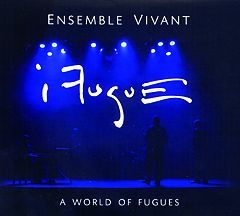 countries, headlined by the form’s exemplar, J.S. Bach. ‘Fugue’ comes from the Latin word for flight and is characterized by a single motif, with one voice pursued by another in an interplay of point and counterpoint. Standouts among this album’s 15 tracks include a “Prelude & Fugue” by Shostakovich which is the musical incarnation of a fast flowing stream that sweeps us along in its sparkling embrace. The late Canadian arranger John Burke adds strings to the original solo piano, giving the piece an almost orchestral sound. Bach’s “Little Fugue” is instantly familiar, with its classical elegance and propulsive emotional intensity. The same composer’s “Fugue in G Major” has a perfect to and fro between cello and piano which propels its irresistible forward momentum. For its part, the Venezuelan composer Aldemara Romero’s “Fuga con Pajarillo” tells a bittersweet story: dance-like, with echoes of the tango, it has nice moments of drama, making effective use of the maracas. The album has three world premieres. One of them, John Burke’s “Fuga del Sur,” has a perfect conversation between piano and bass. The album’s title track, “iFugue,” which is Burke’s arrangement of Vivaldi (see link below), has an engaging interplay of several instrumental voices that conjures a sense of riffing or improvisation in its kaleidoscope of changing moods. Its interplay of different instruments sometimes complement each other, sometimes stand in pleasing counterpoint, while the effective use of drums propels it into the modern world. https://www.youtube.com/watch?v=mhht1LgJ34o
countries, headlined by the form’s exemplar, J.S. Bach. ‘Fugue’ comes from the Latin word for flight and is characterized by a single motif, with one voice pursued by another in an interplay of point and counterpoint. Standouts among this album’s 15 tracks include a “Prelude & Fugue” by Shostakovich which is the musical incarnation of a fast flowing stream that sweeps us along in its sparkling embrace. The late Canadian arranger John Burke adds strings to the original solo piano, giving the piece an almost orchestral sound. Bach’s “Little Fugue” is instantly familiar, with its classical elegance and propulsive emotional intensity. The same composer’s “Fugue in G Major” has a perfect to and fro between cello and piano which propels its irresistible forward momentum. For its part, the Venezuelan composer Aldemara Romero’s “Fuga con Pajarillo” tells a bittersweet story: dance-like, with echoes of the tango, it has nice moments of drama, making effective use of the maracas. The album has three world premieres. One of them, John Burke’s “Fuga del Sur,” has a perfect conversation between piano and bass. The album’s title track, “iFugue,” which is Burke’s arrangement of Vivaldi (see link below), has an engaging interplay of several instrumental voices that conjures a sense of riffing or improvisation in its kaleidoscope of changing moods. Its interplay of different instruments sometimes complement each other, sometimes stand in pleasing counterpoint, while the effective use of drums propels it into the modern world. https://www.youtube.com/watch?v=mhht1LgJ34o
Review copyright © 2022 by John Arkelian
****************************************
Diana Panton: A Cheerful Little Earful (2019) (B+/A-): This second jazz album for children is ostensibly meant for kids; but, the truth is that it’s a certified treat for all ages! Hamilton native Diana Panton describes 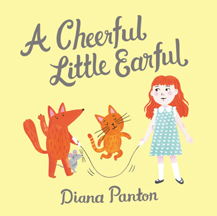 the album as “a happy album for kids and the young at heart.” How right she is about that. These 15 tracks conjure the innocence of childhood; yet there is nothing childish about these songs or their touching presentation. Pride of place goes to “Happy Talk,” that infectiously ebullient song from the Rodgers and Hammerstein musical “South Pacific.” Its instructive message is good advice for listeners young and old: “If you don’t have a dream, how you gonna have a dream come true?” Panton is the embodiment of vocal sunshine to melt your worries away and iron out life’s pesky creases. Her voice is sweet and gentle, yet also self-assured and utterly irresistible. There’s a playful quality to many of the songs (like “‘A’ You’re Adorable”) and to the voice that sings them. It’s an accessible, girl-next-door kind of voice, and Panton brings these songs to life with artistry, authenticity, and ever-so-appealing purity of heart. In “It’s an Unusual Day,” she playfully tweaks the lyrics slightly to reference a born Hamiltonian. Elsewhere, she invites us to “tra la la your cares away.” “Music and Me” is a heartfelt ode to a dear companion. “Look to the Rainbow” has a nice a cappella opening, poignantly unfolding like a Celtic proverb: “Follow the fellow who follows a dream.” “Aren’t You’re Glad You’re You?” has an upbeat, positive message, dappled with sunny optimism as it hearkens back to the less cynical times we might encounter in a 1930’s movie. And, “Sing a Rainbow” is touchingly evocative in its call to “listen with your eyes, sing everything you see.” Diana Panton won a Juno for her first children’s album in 2017 and the 2015 Juno for Best Jazz Album. This new release (on which Panton is joined by Reg Schwager on guitar and Don Thompson on bass, guitar, and vibes) is a worthy addition to her estimable body of work — and it has charming illustrations by Jacqui Lee. https://www.dianapanton.com/
the album as “a happy album for kids and the young at heart.” How right she is about that. These 15 tracks conjure the innocence of childhood; yet there is nothing childish about these songs or their touching presentation. Pride of place goes to “Happy Talk,” that infectiously ebullient song from the Rodgers and Hammerstein musical “South Pacific.” Its instructive message is good advice for listeners young and old: “If you don’t have a dream, how you gonna have a dream come true?” Panton is the embodiment of vocal sunshine to melt your worries away and iron out life’s pesky creases. Her voice is sweet and gentle, yet also self-assured and utterly irresistible. There’s a playful quality to many of the songs (like “‘A’ You’re Adorable”) and to the voice that sings them. It’s an accessible, girl-next-door kind of voice, and Panton brings these songs to life with artistry, authenticity, and ever-so-appealing purity of heart. In “It’s an Unusual Day,” she playfully tweaks the lyrics slightly to reference a born Hamiltonian. Elsewhere, she invites us to “tra la la your cares away.” “Music and Me” is a heartfelt ode to a dear companion. “Look to the Rainbow” has a nice a cappella opening, poignantly unfolding like a Celtic proverb: “Follow the fellow who follows a dream.” “Aren’t You’re Glad You’re You?” has an upbeat, positive message, dappled with sunny optimism as it hearkens back to the less cynical times we might encounter in a 1930’s movie. And, “Sing a Rainbow” is touchingly evocative in its call to “listen with your eyes, sing everything you see.” Diana Panton won a Juno for her first children’s album in 2017 and the 2015 Juno for Best Jazz Album. This new release (on which Panton is joined by Reg Schwager on guitar and Don Thompson on bass, guitar, and vibes) is a worthy addition to her estimable body of work — and it has charming illustrations by Jacqui Lee. https://www.dianapanton.com/
Review copyright © 2019 by John Arkelian
****************************************
Ensemble Vivant: Latin Romance (Opening Day, 2019) (B+/A-): Pianist and ensemble artistic director Catherine Wilson is joined for this ebullient celebration of Latin music by Corey Gemmell on violin, Norman Hathaway on viola, Jim Vivian on bass, Sybil 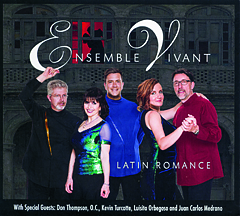 Shanahan on cello, Don Thompson on vibes, Juan Carlos Medrana & Luisito Orbegosa on Latin percussion, and Kevin Turotte on trumpet. Their performance of these 13 tracks, by composers ranging from across Latin America and Spain (and a few closer to home), is a vibrant testament to musical élan. Several selections get our nod as album standouts. Andalucia (by Ernesto Lecuona) transports the listener to Spain: a travelogue of the mind’s eye, it has a wonderfully evocative melody that’s chock-full of local color and charm. Dansa Negra (by Mozart Carmago Guarnieri) likewise tells a visual story, conjuring, for us, the Antebellum South, with lyrically emotional resonance. Bernardo’s Tango (by Canadian Phil Dwyer) has a cinematic feel to its moments of drama; while Oblivion (by Astor Piazzollo) is a study in bittersweet poignancy. Leroy Anderson’s Serenata sways across the dance floor like Astaire & Rogers. For its part, Cité Tango (by Astor Piazzolla) starts with subtly discordant rhythms. With its passionately intense fixation on its objet de désir, it is dance as duel – until, that is, it segues into a gentle resolution in a closing section that is pleasingly reminiscent of Catherine Wilson’s own work as a composer. Isaac Albenez’ ever-so-traditional Tango in D is tango comfort-food. And Canadian John Burke’s La Despedida is tango as reverie, the musical incarnation of a gentle pas de deux with one’s beloved.
Shanahan on cello, Don Thompson on vibes, Juan Carlos Medrana & Luisito Orbegosa on Latin percussion, and Kevin Turotte on trumpet. Their performance of these 13 tracks, by composers ranging from across Latin America and Spain (and a few closer to home), is a vibrant testament to musical élan. Several selections get our nod as album standouts. Andalucia (by Ernesto Lecuona) transports the listener to Spain: a travelogue of the mind’s eye, it has a wonderfully evocative melody that’s chock-full of local color and charm. Dansa Negra (by Mozart Carmago Guarnieri) likewise tells a visual story, conjuring, for us, the Antebellum South, with lyrically emotional resonance. Bernardo’s Tango (by Canadian Phil Dwyer) has a cinematic feel to its moments of drama; while Oblivion (by Astor Piazzollo) is a study in bittersweet poignancy. Leroy Anderson’s Serenata sways across the dance floor like Astaire & Rogers. For its part, Cité Tango (by Astor Piazzolla) starts with subtly discordant rhythms. With its passionately intense fixation on its objet de désir, it is dance as duel – until, that is, it segues into a gentle resolution in a closing section that is pleasingly reminiscent of Catherine Wilson’s own work as a composer. Isaac Albenez’ ever-so-traditional Tango in D is tango comfort-food. And Canadian John Burke’s La Despedida is tango as reverie, the musical incarnation of a gentle pas de deux with one’s beloved.
Review copyright © 2021 by John Arkelian
****************************************
Catherine Wilson on the late composer and collaborator John Burke: 
“I first met the brilliant Canadian composer John Burke in late 1980 at the University of Michigan. I was a student of the late Theodore Lettvin in the Master’s Program in Piano Performance, and John was completing his Doctorate in Composition. John reacted to my playing with the astute observation that, ‘You play the piano as though you’re a string player.’ Many of the people I’ve met through my music-making have been instrumental in my life’s journey – both musically and otherwise. John Burke was one of those people; and our friendship, musical collaboration, and spiritual connection was to endure for four decades. We were like kindred spirits. Sometimes, he would be on the road for months on end, travelling the globe to places like India, Turkey, Bali, and Berlin on grants for composing. Whenever he could, John would travel to hear me perform, and we loved discussing our respective musical projects by telephone.
Along with his musical genius, John was an erudite, supremely intelligent, highly spiritual, and generous man, with a quick wit and wonderful sense of humour. His music will endure the test of time. John wrote the compelling art-tango La Despedida for solo piano and gave it to me as a gift. Featured on Ensemble Vivant’s Latin Romance album, it had its world premiere at the album launch at Hugh’s Room Live in Toronto on December 6, 2019 – to a sold-out crowd, with John in attendance. Who’d have guessed that he would pass away only six weeks later (on January 18, 2020) at the too-early age of 68? I miss him terribly.”
When the pandemic is finally behind us, Ensemble Vivant plans to celebrate John Burke’s musical life with a tribute concert. In the meantime, watch Catherine Wilson performing La Despedida live in concert at: https://youtu.be/row9wKrX1H4
Edited by John Arkelian
****************************************
Ensemble Vivant: Tribute to Rick Wilkins – Live in Concert (Opening Day, 2017) (B+): Recorded in May 2017 at 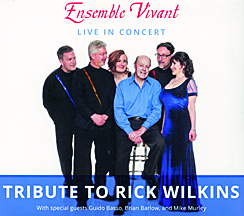 Grace Church-on-the-Hill in Toronto, this album celebrates the long and fruitful musical collaboration between the estimable Canadian composer and arranger Rick Wilkins and Catherine Wilson’s Ensemble Vivant. Indeed, ten of these 13 tracks were arranged by Wilkins; the other three are his own compositions. Together, they showcase the ensemble’s always eclectic repertoire, which runs the gamut from classical to jazz, with stops along the way for ragtime, tangos, and more. Our favorites include the elegant precision of J.S. Bach’s Fugue in G Minor; the hauntingly bittersweet traditional melody Greensleeves; the dreamy romanticism on piano of Jerome Kern’s All the Things You Are; the irresistible immersion into the passion and exoticism of Spain that is Ernesto Lecuona’s Andalucia; and the emotive horns, which evoke yearning and reverie in equal measure, of Wilkins’ own American Ballad. For its part, ‘the Little Tramp’s’’ Chaplin Medley wears its heart on its sleeve – subdued and poignant one moment, it is exuberant the next, before it segues into a Latin tango; but, its highlight is the wistful song Smile. Wilson (on piano) is joined by Corey Gemmell (violin), Norman Hathaway (viola), Sybil Shanahan (cello), Jim Vivian (bass), Guido Basso (flugelhorn/trumpet), Brian Barlow (drums/percussion), and Mike Murley (saxophone). The album’s companion DVD has excerpts from the concert – interspersing music with short interviews. Alas, however, the DVD pixilated and stalled on our Toshiba DVD-player.
Grace Church-on-the-Hill in Toronto, this album celebrates the long and fruitful musical collaboration between the estimable Canadian composer and arranger Rick Wilkins and Catherine Wilson’s Ensemble Vivant. Indeed, ten of these 13 tracks were arranged by Wilkins; the other three are his own compositions. Together, they showcase the ensemble’s always eclectic repertoire, which runs the gamut from classical to jazz, with stops along the way for ragtime, tangos, and more. Our favorites include the elegant precision of J.S. Bach’s Fugue in G Minor; the hauntingly bittersweet traditional melody Greensleeves; the dreamy romanticism on piano of Jerome Kern’s All the Things You Are; the irresistible immersion into the passion and exoticism of Spain that is Ernesto Lecuona’s Andalucia; and the emotive horns, which evoke yearning and reverie in equal measure, of Wilkins’ own American Ballad. For its part, ‘the Little Tramp’s’’ Chaplin Medley wears its heart on its sleeve – subdued and poignant one moment, it is exuberant the next, before it segues into a Latin tango; but, its highlight is the wistful song Smile. Wilson (on piano) is joined by Corey Gemmell (violin), Norman Hathaway (viola), Sybil Shanahan (cello), Jim Vivian (bass), Guido Basso (flugelhorn/trumpet), Brian Barlow (drums/percussion), and Mike Murley (saxophone). The album’s companion DVD has excerpts from the concert – interspersing music with short interviews. Alas, however, the DVD pixilated and stalled on our Toshiba DVD-player.
Review copyright © 2021 by John Arkelian
****************************************
Catherine Wilson on collaborator Rick Wilkins:
“A wonderful life-long musical collaboration began for me in January 1990. I had heard Rick Wilkins perform with the Boss Brass and the Rick Wilkins Quartet and loved his playing as well as his arrangements. So, I mustered the nerve to approach him about arranging for my classical-based group, Trio Vivant, which was comprised of piano, violin, and cello. The first piece he arranged for us was Jerome Kern’s All the Things You Are, which aptly leads off this live tribute recording, but with an evolved octet arrangement for piano, violin, viola, cello, bass, flugelhorn, sax, and percussion.
Rick went on to arrange dozens of pieces for us from such composers as J.S. Bach, Astor Piazzolla, George Gershwin, Georges Bizet, Leroy Anderson, Maurice Ravel, Scott Joplin, Manuel de Falla, Charlie Chaplin, and Ernesto Lecuona – not to mention glorious Christmas classics. Rick’s own composition Divertissement featured a different musical genre in each of its three movements, coinciding with some of the genres Ensemble Vivant has always performed. Divertissement concludes this live recording.
Rick is a master-supreme: No matter the genre or style, his writing is tasteful, imaginative, sparkling, and, simply put, brilliant. An integral force in Ensemble Vivant’s music, Rick also acted as recording producer for many of our earlier recordings. He frequently discovered repertoire for us; and he would eagerly call to tell me about his new find. Over the years, Rick and his wife Carolyn became my close friends.
This live recording gives a glimpse into the range of styles and genres that Rick arranged for Ensemble Vivant; but, truth be known, his output could easily fuel four albums, each with entirely different repertoire written or arranged by him for Ensemble Vivant. This album is a tribute to a great man, a great artist, and a great friend.”
Edited by John Arkelian
****************************************
Prokofiev: Romeo and Juliet (Naxos, 2018) (A): Brilliant, bittersweet, and achingly emotional from its opening notes, Sergey 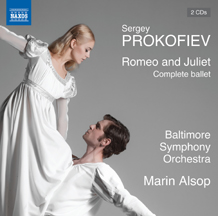 Prokofiev’s (1891-1953) great score transmogrifies Shakespeare’s story of ill-fated love into a narrative ballet. Here is music that embodies the psyche of its characters and the changing moods of their story – from playfulness (e.g. the joking Mercutio and the early appearances of the sprightly Juliet) to passionate yearning and on to tragedy. The result is full of drama, ranging from lyrical to frenetic, and from foreboding to the romantic writ-large (as in the balcony scene), as it follows a tale of true love, rivalry, conflict, and despair. Among its highlights: Juliet’s gradual transit in Act One from excitable girl to young woman (depicted by the music’s evolution from melodic freneticism to calm); the regal arrival of the guests at the Capulet ball; the mischievous mood of the masked interlopers; and, especially, the unforgettable “Dance of the Knights.” That latter section is a powerful musical representation of pride, privilege, and duty – but, above all, pride. Full of gravitas, that section is beautiful, but implacable and as cold as adamantine. This recording of the full ballet (on two CDS, with a run-time of 2:24) by the Baltimore Symphony Orchestra under Marin Alsop is highly recommended. We noticed what may be a technical recording issue, however, when the softest sections seemed to drop off the register entirely.
Prokofiev’s (1891-1953) great score transmogrifies Shakespeare’s story of ill-fated love into a narrative ballet. Here is music that embodies the psyche of its characters and the changing moods of their story – from playfulness (e.g. the joking Mercutio and the early appearances of the sprightly Juliet) to passionate yearning and on to tragedy. The result is full of drama, ranging from lyrical to frenetic, and from foreboding to the romantic writ-large (as in the balcony scene), as it follows a tale of true love, rivalry, conflict, and despair. Among its highlights: Juliet’s gradual transit in Act One from excitable girl to young woman (depicted by the music’s evolution from melodic freneticism to calm); the regal arrival of the guests at the Capulet ball; the mischievous mood of the masked interlopers; and, especially, the unforgettable “Dance of the Knights.” That latter section is a powerful musical representation of pride, privilege, and duty – but, above all, pride. Full of gravitas, that section is beautiful, but implacable and as cold as adamantine. This recording of the full ballet (on two CDS, with a run-time of 2:24) by the Baltimore Symphony Orchestra under Marin Alsop is highly recommended. We noticed what may be a technical recording issue, however, when the softest sections seemed to drop off the register entirely.
Review copyright © 2018 by John Arkelian
****************************************
‘God Unseen, Seen in Love’
© Music review by John Arkelian
We were not previously familiar with the music of Canadian singer/songwriter Steve Bell; but we are ever so pleased to make 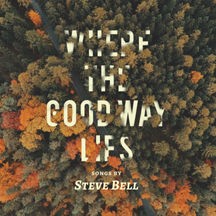 his musical acquaintance now. Indeed, his new CD, “Where the Good Way Lies” (Signpost Music), which is his 20th album, is like meeting an old friend. These thirteen tracks are songs about hope and love – gentle, poetic, and intelligent, they are full of ideas. And, as Bell says, “That’s the way it is with songs… they often seem to know more than those who wrote them.” Consider “Love Song:” At first blush, this song (written by Bruce Cockburn) may be about the love between two human beings. But, to this listener, it spoke of our love for the divine: “In the place my wonder comes from / There I find you… When you be beside me / I am real… Though my eyes be closed forever / Still I would find you.” The devotional interpretation of those words presents God as our true kindred spirit, one with whom we have a close and tangible connection.
his musical acquaintance now. Indeed, his new CD, “Where the Good Way Lies” (Signpost Music), which is his 20th album, is like meeting an old friend. These thirteen tracks are songs about hope and love – gentle, poetic, and intelligent, they are full of ideas. And, as Bell says, “That’s the way it is with songs… they often seem to know more than those who wrote them.” Consider “Love Song:” At first blush, this song (written by Bruce Cockburn) may be about the love between two human beings. But, to this listener, it spoke of our love for the divine: “In the place my wonder comes from / There I find you… When you be beside me / I am real… Though my eyes be closed forever / Still I would find you.” The devotional interpretation of those words presents God as our true kindred spirit, one with whom we have a close and tangible connection.
Positing such big ideas with such elegantly simple turns of phrase, these songs (two of which are instrumentals) somehow manage to speak to us about knowing and loving God without didacticism or overweening religiosity. Quite the contrary: These songs make the divine as natural (and as accessible) as life itself, even as they express deep ideas – like the coexistence of beauty and suffering, even when (as for the aging), “life is like a faded leaf.” Sometimes, the words of others (including Augustine, the 19th century poet Christina Rossetti, Robert Louis Stevenson, Rainer Maria Rilke, and a contemporary Anglican minister) are the inspiration for the lyrics. One song is inspired by Psalm 62: With its words about refuge and hope, it was penned on the very day the first group of Syrian refugees arrived in Canada in 2016.
Here, then, are musical prayers – bright, fresh, and insightful, without ever being preachy, saccharine, or overbearing. Sometimes stirring, sometimes poignant, always quite lovely, these songs speak to the soul’s great longing, and to that which gives it sustenance: “The only thing left for us to do is love… And as we love the other, God abides in us / God unseen / Seen in love.”
John Arkelian is an award-winning author and journalist.
Copyright © 2017 by John Arkelian.
****************************************
24 CDs Reviewed
© by John Arkelian
Allie Hughes: Waiting for the Prize (B+/A-): Remarkable first album from a Canadian singer/songwriter who’s clearly destined for big things. Hughes performed at a fundraiser for the Oshawa Little Theater last fall, with her fellow “Maria” competition contestant Donna Lajeunesse. She shows serious singing chops and musical versatility here. These ten tracks are full of fast, catchy rhythms, and fancy vocal footwork, and “Fall” appealingly exemplifies both. Hughes has a seductive voice, smart lyrics, moments of irreverent humor, and melodies that go in unexpected directions. The result is a bit sexy, a bit witty, and altogether engaging. “Bad Luck” is a jazzy, bluesy song that sounds like a show tune from the musical stage. It’s a first-rate song, powerfully delivered. “That’s Just Me” is an ironic juxtaposition of down-to-earth lyrics and an operatic lament. Meanwhile, “What Have I Done?” is a serious reverie on life’s choices; with a hint of the bittersweet, it’s quite affecting. All we can say is, Wow! Run out and get this album! www.myspace.com/alliehughes
5 Stars: Favorites from the 5 Browns (RCA Red Seal) (B+): Five siblings (three sisters and two brothers), talented pianists all, present a selection of solos, duets, trios, and quintets. Their “Scenes from West Side Story” is full of colors and emotion; “Flight of the Bumble Bee” is devoted to dazzling speed; while Copland/Dvorak’s “Simple Gifts/Going Home” is an emotional roller-coaster, full of joy, nostalgia, and home-sickness. Elsewhere, there’s delicacy and precision (in Ignaz Friedman’s “Tobatiene a musique, Op. 33, No. 3”); romanticism (in Grieg’s “Ich liebe dich, Op. 41, No. 3); and lyricism (in Debussy’s “Clair du Lune”). And to top things off memorably, there’s “Home Blues” from Gershwin’s “An American in Paris,” with guest Chris Botti on trumpet; and two paragons of passion: Rachmaninoff’s “18th Variation” from “Rhapsody on a Theme of Paganini” and Lecuona’s “Malaguena” from “Andalucia Suite.”
Burt Bacharach Live at the Sydney Opera House (Verve Music) (A-): Medleys and some entire songs in a recorded concert with the Sydney Symphony Orchestra and vocalists (Josie James, John Pagano, and Donna Taylor are very good), with composer Burt Bacharach at the piano. Many of these songs are classics of pop music. (Hal Davis wrote the lyrics to a lot of them.) If you don’t know them by name, you’re certain to recognize the melodies when you hear them. Standouts include: the bittersweet “Close to You,” “I’ll Never Fall in Love Again,” “What’s New, Pussycat,” “Walk On By,” “This Guy’s in Love with You,” and “I Say a Little Prayer.” One song, “Always Something There to Remind Me,” must be arranged differently here; this version sounds different from the one we remember. The characteristic sound of these songs is ‘perky,’ for want of a better word; most of them are romantic and a little bit jazzy. There’s just one regret: The hit songs in the medleys deserved full-length renditions, rather than the mere samples we get here.
Sean Kelly: Christmas Guitar (Opening Day) (B+): 15 tracks, all of them Christmas favorites, played on acoustic guitar, supplemented here and there by electric guitar. These peaceful and gentle renditions were arranged by Sean Kelly and James Robertson. Most hue pretty closely to the traditional versions, and that’s all for the good when it comes to such beloved classics. There’s the occasional segue (as in “The Angel Gabriel”) to an electric guitar riff, but such musical detours never seem necessary, save, perhaps, for the outright substitution of electrics for acoustical guitars in “Carol of the Bells,” which does, we must admit, work very well.
Yo Yo Ma & Friends: Songs of Joy and Peace (Sony Classical) (B/B+): An eclectic mix of musical genres and performers that assembles piano, sax, guitars, fiddle, bagpipes, clarinet, harp, ukulele, and mandolin, and vocalists as diverse as Diana Krall, James Taylor, Renee Fleming, and Alison Kraus. Yo Yo Ma’s cello is heard on nearly every track; while Natalie McMaster (on fiddle), Paquito D’Rivera (on clarinet), Chris Botti (on trumpet), and the Silk Road Ensemble are just a few of the many performers with whom he is paired in this celebratory ode to the season. Their repertoire ranges from beloved Christmas classics like “Joy to the World” to unexpected fare like “Here Comes the Sun.” As the lead artist says, “There are as many ways to achieve peace as there are to express joy.” Highlights include: “The Wassail Song/All Through the Night,” the haunting “Wexford Carol,” a clarnet and piano improvisation on “Dona Noblis Pacem,” “My One and Only Love” (with tenor saxophone), and “Happy Christmas (War is Over).”
The Salvation Army: Together (VCJ Music) (B+/A-): Music to inspire! 14 tracks, every one of them memorable, from the Salvation Army’s world-class International Staff Band. Stand-outs include the powerful and moving “Nimrod” by Elgar, “You Raise Me Up,” and “Somewhere Over the Rainbow.” The band is joined by vocalist Aled James for one track and by Leslie Garrett for a stirring rendition of “You’ll Never Walk Alone,” and, the Fron Male Voice Choir joins the band for “Going Home.” Together, these songs are guaranteed to give you a glimpse of the golden dawn that awaits after life’s storms.
Joshua Bell – Vivaldi: The Four Seasons (Sony Classical) (A-): This is violinist Joshua Bell’s first recording of Antonio Vivaldi’s classic concertos. He’s joined by the Academy of St. Martin in the Fields and by harpsichordist John Constable. The album also contains Giuseppe Tartini’s “Sonata in G Minor” (the “Devil’s Trill Sonata”). Bell notes the inventiveness and scope for individuality offered by these great works of Baroque music. They’re rousingly dramatic, too, as in the “Allegro non molto” section of “Winter.”
The Canadian Tenors (Universal) (A-): This blend of operatic and pop sounds, with an occasional hint of “new age,” follows in the footsteps of the kind of repertoire favored by Sarah Brightman, RyanDan, Il Divo, Andrea Bocelli, et al. There’s even an ode to the glories of Cape Breton Island written by Rita MacNeil. (When the lyrics to that song say, “There are places that will bring you to your knees,” you can believe it!) The repertoire is not precisely classical, but it is informed by a classical sensibility. Each of the quartet has a strong voice and ample individuality. (We get only their first names – Victor, Remiglio, Fraser, and Jamie – for some reason.) And there’s a very nice choice of material: It’s robust, emotional, and instantly involving, and it shows off the foursome’s vocal power and range to good effect. The songs are in English, Italian, and French – and, in one case, Gaelic. Standouts include “Because We Believe” and “Remember Me.” Upbeat and inspirational, it’s a keeper.
RocknRolla (Hip-O Records/Universal) (B+/A-): Award-caliber, rockin’ score to one of the best films of 2008 – Guy Ritchie’s darkly funny, deftly idiosyncratic look at London’s subculture of guns, drugs, and rock and roll – with its playful take on sex, danger, ill-gotten gain, and being cool. Played over the opening credits, Black Strobe’s “I’m a Man” sets the tone from the get-go with driving blues rhythms. Then there’s The Sonics 1965 song, “Have Love, Will Travel;” and The Clash’s 1980 song “Bank Robber,” which is a childhood favorite of the film’s sardonic, drugged-out, but remarkably perceptive rock star cum poseur ‘Johnny Quid.’ Elsewhere, Kim Fowley’s 1966 song “The Trip” lives up to its name with its trippy, ever-building tempo; while Wanda Jackson’s “Funnel of Love” (1960) will instantly transport you back in time. But, The Subways’ 2005 song “Roll & Roll Queen” takes the place of honor here; it could be the anthem for the entire film, combining a sense of recklessness, irreverence, and sheer gusto in one great beat!
Molly Johnson: Lucky (Universal) (B+): 14 tracks from the Canadian jazz singer from jazz and pop repertoire. Johnson has an appealing voice, and she presents confident renditions of memorable songs from strong arrangements. She co-wrote one of these songs; Duke Ellington and George Gershwin contributed others. They range from playful (“Whatever Lola Wants”) to mellow (“I Got it Bad”) to huskily seductive “Lush Life”). Stand-outs include “It Ain’t Necessarily So” and “I’ll Never Smile Again.”
Duane Andrews: Raindrops (B+/A-): 5 of these 11 tracks were composed by the Canadian guitarist and composer based in St. John’s, Newfoundland. His guitar is joined by trumpet, vibraphone, rhythm guitar, and bass (as well as by the Atlantic String Quartet for some tracks) for a jazzy, honkytonk sound. Technically ambitious and aesthetically impressive, these tracks combine complex rhythms and distinctive sounds. The result is very pleasing to the ear indeed. Some of the songs find their inspiration in traditional Newfoundland music. That comes through to pleasing effect in “Bees and Flowers/Joe Smallwood’s,” an irresistible medley of two reels. This may be the best jazz album of the year! www.duaneandrews.ca
Defiance (Sony Classical) (B+): Film-score by James Newton Howard using a full symphony orchestra, with violin solos by Joshua Bell. The film was about Polish brothers who took a large assembly of Jews under their wing as they wage a guerilla war against the Nazis from their shelter in the forest. Richly emotional, the music is delicate and haunting, with moments of suspense, sadness, resolve, and martial conflict. And there are some nice ethnic music motifs.
Four Christmases (Decca) (B over-all; selected tracks A): Fortunately, this is one film score that requires no familiarity at all with the film. It exists to complement a very silly looking comedy film; but, it’s really a compilation disc of well-known seasonal fare. Offering traditional arrangements of songs like “Sleigh Ride,” “I’ll Be Home for Christmas” (Dean Martin), and “O Little Town of Bethlehem,” it would make a nice addition to a collection of Christmas music. Best of all, it avoids fiddling with these well-loved songs; consistent with this reviewer’s view that, when it comes to the songs of Christmas, if they’re not broken, don’t fix them. A standout here is Gavin DeGraw’s rendition of “Jingle Bell Rock.” Perry Como and Louis Armstrong are also on board. As for misfires, the collection didn’t need Tom Petty’s rock-carol “Christmas All Over Again” or the song “Seasons Greetings,” neither of which is in the same league as the more familiar fare. But the album’s main failing is its rather brief (at about 33 minutes) running time.
Sarah Brightman: A Winter Symphony (EMI) (A-): 15-track CD, with DVD and documentary. It’s eclectic material, all sung with orchestral backing: a song by the male half of ABBA, sacred music (two versions of “Ave Maria” and “Jesu, Joy of Man’s Desiring”), a Christmas hymn (“Silent Night”), devotional music (“Amazing Grace”), traditional folk music (“In the Bleak Midwinter”), and a song about lost love (“Colder than Winter”), all featuring the signature soprano voice, emotionalism, and lush romanticism of a performer who is also a vision of beauty. Other highlights include: “Child in a Manger,” Bach’s “Ave Maria,” John Lennon’s “Happy Christmas (War is Over),” and the simply electrifying “When a Child is Born.”
Serena Ryder: Is It O.K. (EMI) (A-): 13 tracks by the talented Canadian singer/songwriter with a distinctively strong and husky voice, all of them written (or co-written) by her. Ryder is a real talent to behold. She won a Juno Award in 2008 as ‘Best New Artist’ for her previous album “If Your Memory Serves You Well,” her memorable renditions of standards from the past. In March 2009, this new album won a Juno as ‘Best Adult Alternative Album.’ Pop meets storytelling ballad here, with some rock licks and a voice that would equally suit folk music. With its very catchy melody, rhythms, and lyrics, “Little Bit of Red” is the piece de resistance on this album: “Oh baby blue, oh baby blue, c’mon here, I’m gonna smear another color over you.” There’s heartache, strength, and wisdom in these songs. “Brand New Love” has a nice quiver to the vocals, and there’s still more of that irresistible emotional quaver (one that raises goosebumps of empathy) in “Stumblin’ Over You.” For its part, “Weak in the Knees” is a strong entry on the country music side of the aisle; while the folksy “Dark as the Black” has Ryder using only her acoustic guitar for most of the song: “One world, one love, means nothing if you’re just pretending… To do your part, there’s nothing to good intentions.” Ryder is a very talented composer and lyricist; and these are remarkably well-written songs. www.serenaryder.com
Jill Barber: For All Time (Baudelaire/Dependant Music) (B+): 11 tracks written by a talented Canadian singer/songwriter, with a nice diversity of musical styles and an impressive vocal range that combines with unmistakeable self-confidence for a highly appealing result. “When I’m Making Love to You” is playful, a bit jazzy, and a bit like a snappy Mary Hopkin ballad, with just a hint of an arch vaudevillian humor. “Just for Now” is languid and a bit sultry, in a wholesome way; “Ashes to Ashes” is a clear-eyed reflection on mortality; “Hard Line” offers a captivating rhythm; “Legacy” is a pensive ode; “Goodnight Sweetheart” has sad resignation over lost love in the style of new country; and “Starting to Show” has appealingly catchy lyrics: “Oh I am in love and it’s starting to show / From the tip of my cap to the bottom of my soul / So talk me sweet and dance me slow.” What’s really starting to show is that Barber has talent to spare. www.jillbarber.com
Kristin Sweetland: Own Sweet Time (Arbora Vita Music) (B+): A new album by another talented Canadian singer/songwriter, complete with poetic lyrics (“Over ships of folded paper / Does the blackened raven fly”). There’s “Gone Gone Gone,” a ballad about the trials and tribulations of a solo journey by car across the endless miles of the Trans-Canada Highway; a meditation on good and evil prompted by late-night conspiracy talk radio; half-serious musings (complete with an allusion to ‘Mulder & Scully,’ the hapless investigators of all things paranormal on television’s “The X-Files”) about the apocalyptic possibilities posed by the ‘red rain’ that fell in southern India in 2001; an instrumental acoustic guitar solo tribute to Emily Carr’s painting “Vanquished” (a highlight of the album) and nature’s power to outlast civilizations; “The Fox Fires,” about two friends biding a final adieu to a beloved cabin in Virginia’s Blue Ridge Mountains (a fiddle and banjo add a twang that suitys the setting); and a song set set at a small Arizona motel that has flamenco guitar licks. And the lyrics in “Xanadu” made an impression on this writer: “Blessed is the pen in the night / Cursed are the words when you can’t get it right / I would give anything not to give in / To the darkness within.” www.kristinsweetland.com
Sarah Brightman: Symphony (EMI) (B+/A-): The CD cover (and booklet art) is all flowing gowns, dramatic gestures, cathedral-like ruins, ominous woods, stone gargoyles, and fantastical amalgams of towers and trees that look like something out of Tolkien’s Middle-earth. The over-all visual effect is Gothic meets fantasy, reminiscent of the Ridley Scott film “Legend.” But, musically, it’s really the stuff of High Romance. The songs seem to have been custom-made as a showcase for Brightman’s clear soprano voice. It’s a shame the lyrics aren’t printed in the booklet. At times, the music (like the CD packaging) is glossy, the stuff of artifice, over-production, and the self-conscious striking of a pose – perhaps to the detriment of simplicity and sincerity. To a degree, it leaves one feeling manipulated; but, even so, there’s no denying that it achieves its goals – conjuring romanticism, beauty, and moments of emotion. It all begins with “Gothica,” which opens with peals of thunder, followed by a driving rhythmic beat and a ‘cri de coeur’ as it segues into the second track, “Fleurs du mal,” with a chorus worthy of Carl Orff’s “Carmina Burana.” “Canto della terra” has some genuinely stirring moments, most of them courtesy of guest Andrea Bocelli; “Sanvean” conveys vulnerability and yearning very nicely; “Running” starts with instantly familiar music of a patriotic bent (a la ‘Pomp and Circumstance’), takes a detour into pop territory akin to John Lennon’s “War is Over,” and then returns whence it began; while “Sarai Qui,” with guest Alessandro Safina has especially strong vocals from both members of the duo.
Lenka (Epic Records/Sony BMG) (B+/A- over-all; one track A+): One song, “The Show,” is worth the price of admission all by itself. A playful, slightly arch reflection on the stage-play we call life, it’s as catchy as can be, and utterly, enchantingly irresistible, just like its Australian singer/songwriter. Perfectly reflecting its performer’s combination of arched brow and sweetly feminine voice, it is uniquely ‘innocent’ and ‘knowing’ all at once. It’s easily the best song of the year – and it’s a keeper! The closest comparison to Lenka’s quirky, vaguely exotic sound in this perky song is the Israeli singer Yael Naem’s song “New Soul.” Elsewhere, there’s “Like a Song,” a sweet, lovely ballad reminiscent of Mary Hopkin; the very catchy beat of “Trouble is a Friend;” and “Skipalong,” which is of a piece with “The Show” in subject (living life) and sound. Another standout, “Anything I’m Not,” is full of innocence and yearning tinged by wistfulness: “I am so tired of being me / I wanna be free / I wanna be new and different / Anything I’m not.” lenkamusic.com
Diana Panton: If the Moon Turns Green (A-): The talented Canadian jazz singer is joined by Reg Schwager (guitar) and Don Thompson (bass & piano) for 16 songs on a celestial theme, songs that concern themselves with the moon and stars above. And, if there was ever music to be enjoyed by moonlight, this is it. By turns playful, sparkling, and enticing, these dreamy songs are the stuff that quiet reveries and other dreams are made of. There’s a lovely femininity and intimacy to Panton’s voice, with hints of wistful yearning. The songs range from the instantly familiar to the relatively obscure. Together, they are a delight to the senses. Highlights include the irresistibly romantic “Quiet Nights of Quiet Stars” (in French and English), Glenn Miller’s “Moonlight Serenade,” “Fly Me to the Moon,” “A Handful of Stars,” and the great “Moon River.” (All that’s missing is the wonderful song “Stardust.”) The result is an intoxicating enchantment that belongs in every music lover’s collection. www.dianapanton.com Note: Panton appears at the Glenn Gould Studio on May 1, 2010.
Eimear Quinn: O Holy Night (A-): Most of this lovely selection of Christmas songs are traditional favorites; three were written by the Irish singer/songwriter Eimear Quinn herself. “O Come O Come Emmanuel” is aptly described as a “jubilant anthem,” and it truly stirs the emotions. “Codail a Linbh,” an Irish lullaby for the baby Jesus, is gentleness given voice; while “In Paradisum,” one of Eimear’s own compositions, is haunting and reverent at the same time. “O Holy Night” is an instant standout; but a non-traditional arrangement is employed for “Silent Night,” when tradition would serve the hymn better. Conversely, the deviation from the standard arrangement accorded the poignant 15th century carol “Coventry Carol” is all to the good, giving the words a more solemn context than that afforded by the standard medieval dance rhythm.
Eimear Quinn: Gatherings (B+/A-): 11 songs, about half of them co-written by the performer, who won the Eurovision song contest in 1995 with “The Voice.” The CD opens with a siren’s song (“I hear your voice on the wind / And I hear you call out my name”) and draws the listener in with ethereal beauty. The songs combine characteristics of Celtic, pop, folk, and new age music. Some, like “White Sail,” are from a song cycle based on the legend of Tristan and Iseult. Quinn would be a fine choice for a soundtrack vocalist when it comes time to score the film version (now in pre-production) of Tolkien’s “The Hobbit,” or, better yet, his High Fantasy, “The Silmarillion,” should it ever make it to the big screen. There’s gentleness and fragility here, a sense of innocence and of the poetic. All of those traits are on hand in “Voice of an Angel.” For their parts, “Angel Dream” is poetic and softly reflective, with a refrain that’s appealingly catchy, in an understated way; “Yann Derrien” is part ballad, part lullaby; and a lullaby-like sensibility pervades “Winter, Fire, and Snow,” one of the album’s loveliest songs. Quinn is distant musical kin to Enya, but she’s also a distinctive voice in her own right. www.eimearquinn.com
Closer: The Best of Sarah McLachlan (Nettwerk) (B+): With 16 songs written (or co-written) by the popular Canadian singer/songwriter, this album should appeal to newcomers and fans alike. There’s a dreaminess to McLachlan’s voice, and the lyrics are worth listening to: “The night is my companion, and solitude my guide,” and “Through this world I stumble, so many times betrayed” (both from “Possession”). And, there’s a variety of sounds, with, for instance “Into the Fire’s” electric guitar chords venturing into rock music mode. For its part, “Hold On” has hints of a country music sound. Standouts include the instantly familiar “Building a Mystery” (“Come out at night, that’s when… the vampires roam”); “Angel” (“In the arms of an angel, fly away from here…”); and a concert recording of “I Will Remember You.” Other notables include “Fallen,” “Adia,” and “U want me 2.” All that’s missing is “Full of Grace.” As folk-informed pop music, it’s introspective, wistful, and dreamy.
Emilie-Claire Barlow: Haven’t We Met? (Empress Music) (A): 13 tracks from the wonderfully talented Canadian jazz singer. Things get off on a fun note with “All I Do is Dream of You” There’s a highly appealing ‘girl next door’ quality to Barlow’s singing: It’s wholesome, but never dull. On the contrary, there’s personality to spare here — playful, confident, a little sexy, and somehow ‘comfortable.’ In short, she’s irresistible! The pace runs the gamut from the near patter of “You’re Driving Me Crazy” to sultriness that’s in no hurry at all (“Comin’ Home Baby”). Other highlights include: “Haven’t We Met?”; the classy, dreamily romantic “I’m Glad There is You,” which is the stuff of happy reveries; the exuberant “Chez Moi;” “Jardin d’Hiver,” which conjures palpable images of an Audrey Hepburn movie, for some elusive reason; and the fast-paced “La Vem A Baiana.” Meanwhile, “You Make Me Feel So Young” is guaranteed to make you smile. The entire selection is a perfect match of performer and material. It’s a sheer, uplifting delight, and you don’t have to be a jazz aficionado to come back for more. Highly recommended! www.emilieclairebarlow.com
Copyright © 2009 by John Arkelian.
